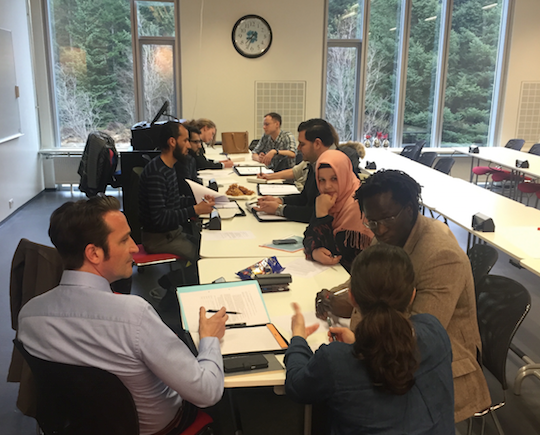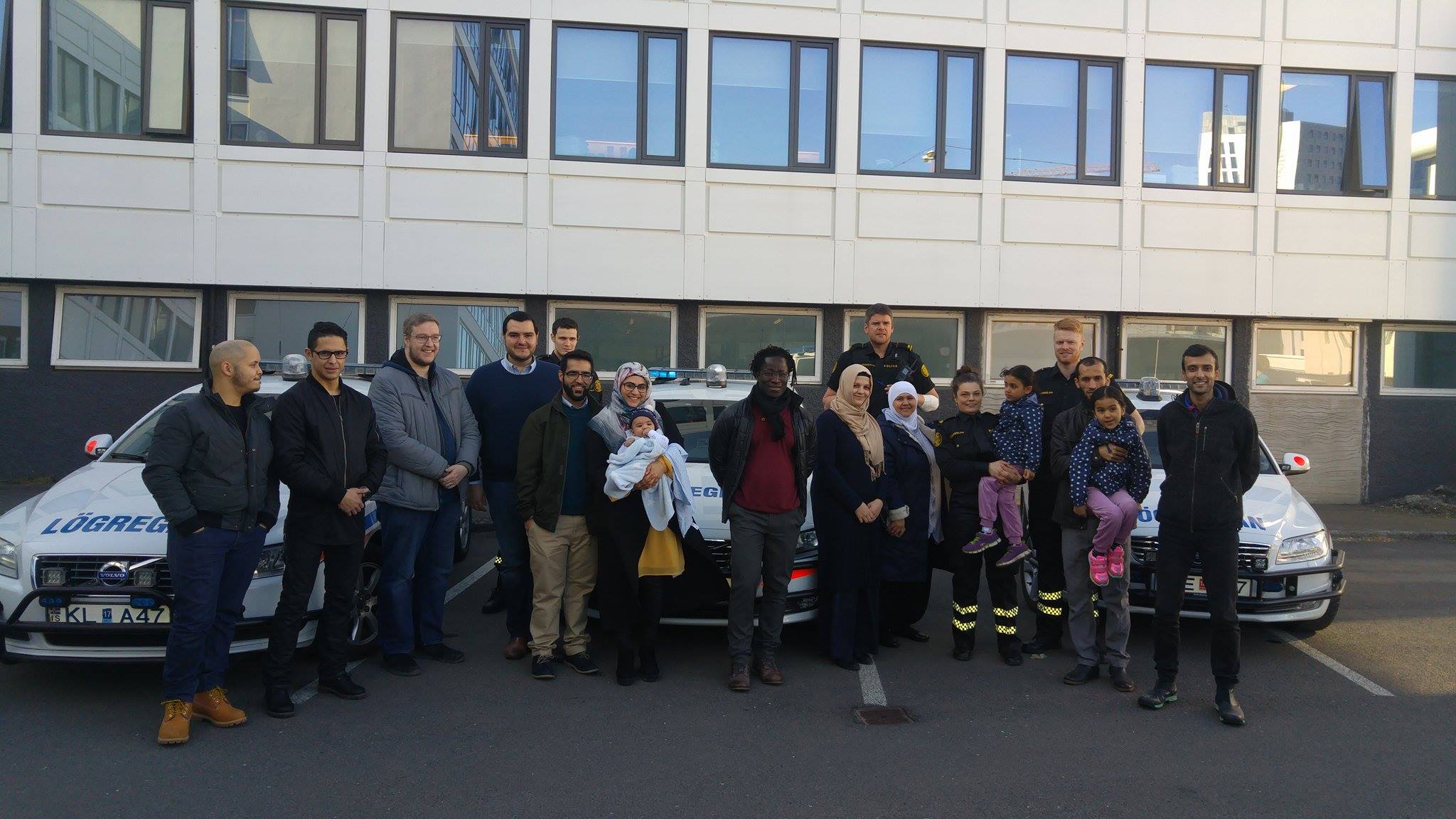Building Trust through Collaboration: Police, Immigrants and Political Activists
Building trust is at the heart of a strong social fabric where people live and work together in harmony – across differences. The capacity to engage with difference becomes increasingly important to the extent in which our societies become more diverse. And that diversity in itself becomes increasingly complex as people from different backgrounds – gender and gender identity, age, ethnic , linguistic, sexual orientation, profession, role in society, socio-economic status, political views, etc. – interact. A common strategy to feel safe is to stay among people who are similar to ourselves. The danger with that strategy is that it favors biases and prejudices about the “other” which in turn creates unhealthy tensions in a society that can lead to physical violence or even war. So what are the alternatives? Meeting the “other”, do something together and reflect on the common experiences. That is the approach taken by two determined women.
Eyrun, an anthropologist and police officer in Iceland, created a program that brings police officers and immigrants – including two imams and members of the LGBT community – together regularly. And Gaëlle, a political activist in France, who witnessed violence during demonstrations in connection with France’s labor law and who decided to literally walk to the other side and start a dialogue with the police. ecloo provided guidance and support to the Icelandic program and helped facilitate the interaction between police and immigrants to come up with concrete measures and actions to strengthen the trust between the two groups. Eyrun and Gaëlle share some of their insights and perspectives in this interview.
In the context of an event organized by AFS Intercultural Programs France at the Musée de l’Histoire de l’Immigration in Paris in March 2017, the French and Icelandic groups met for the first time and presented their projects together. It started stimulating a mutual curiosity that led to a visit of the French Collective to the Icelandic project and hopefully a first step towards a closer collaboration between the two initiatives.
How did you come up with the idea to launch your project?
Gaëlle: Last year (April 2016), during social demonstrations in France against the Labor law, I saw violence between the riot control forces and demonstrators. I saw peaceful demonstrators being hit by policemen. But I also saw violent demonstrators that were there to hurt policemen. In April 2016, before a demonstration, I decided to speak to the riot control forces by sending them a message. I told them that somehow we were going through the same things, we wanted the same things. On a flip chart paper, I wrote all the demands of the police unions and told them that our fight against this labor law was also their fight, and that we should stick together instead of playing the government’s game by fighting each other. To my surprise, I witnessed good reactions both from the police and from demonstrators. It made me realize that something was possible and I never stopped being convinced about it. And it’s been a year: so far, so good!

Starting dialogue with the police by sharing what they have in common: Gaëlle getting in contact with a French police officer.
Eyrun: It is interesting that Gaëlle mentions the common ground between the police and demonstrators. I believe this is a very important first step: Identifying not only what makes us different, but what connects us, our sameness so to speak. Inside the police which has a strong masculine culture, I found a great deal of biases against immigrants. Immigration is a relatively new phenomenon in Iceland so as a society, we need to learn. But this goes in both directions: Many of our immigrants come from societies where police is viewed with suspicion, some of them have experienced corruption first hand. So the concept of working together is a challenge for both sides.

Police officers and immigrants in dialogue at the University of Reykjavik. French visitors from police and civil society are present as well.
You have different people from different backgrounds form common groups, police officers and civilians: How does that collaboration work? What makes it possible?
Gaëlle: I think you need to share a few values to be able to collaborate with your differences. We respect each other which is really important but above all, we trust each other. And this is the key to a healthy collaboration. And to trust each other, we need to be respectful, tolerant, listen to each other, accept critics from others without judging. We tell each other about how we feel. Just like biases, misunderstandings and conflicts come from a lack of information so we always try to explain to each other the reason for our behavior. And we are not afraid to apologize and admit when we made a mistake. Police officers and civilians work together at eye level. In our group of police officers and civilians, we learn to improve our relationships first, then we bring the model to the outside world.
Eyrun: When I first started launching the project, I visited different minority groups. I for example regularly visited two mosques. So I put on my uniform and simply talked to people at the mosque. People asked me: So how did you do that? It was quite simple, really. I just picked up the phone and visited the mosques. So we started creating trust. Eventually, we launched a public call for people to join our program and we were happy to receive many applications. The program consisted of different sessions where people interacted with each other, reflected on their own biases: police in respect to immigrants and vice versa. What was important during the process was to reflect on our actions and the outside facilitation and support by ecloo was very valuable. It made sure that the program did not just become a one time thing but will have a positive long term impact.
Speaking of impact, what was your best moment ? How could you see that the work you did was making a difference?
Gaëlle: There were so many! Recently, I read an interview with a policeman with whom we work daily. We always ask them if they want to talk with journalists but we never really know what they say until we read the entire interview. So the journalist asked him how he has benefited from the project. He said that before he was more inclined to security measures, severe laws, more tempted by the right wing in politics and even looking a bit to the extreme right wing. And then, he met us, the Collective of Policemen and Citizens. And through our dialogue, he realized that security was not the solution, more weapons were not the solution either but rather understanding and tolerance were essential to improve relations between the police and population to bring security at a deeper level. He told the journalist we “left-winged” him (smiles)! This brought me to tears as I realized this was a concrete consequence of our work together. We change each other in a good way.
Eyrun: As the Icelandic project is officially supported by the police (different from the French project which is solely based on private initiative), I was particularly curious to see the impact inside the police. First, I was pleased to see how immigrants started viewing the police differently as they could see that we trusted them also in being part of projects directly affecting the police: So some group members were involved in redesigning the curriculum of the Police Academy namely in the area of dealing with bias. They also visited our premises in Reykjavik at police headquarters and had a chance to interact with our police officers. They became more aware of our common humanity and that behind uniforms, there are human beings: fathers and mothers, people who like nature, people who like to travel, etc. The fact that we had coverage in the national media was rewarding for both the police and the immigrants who participated in our program.
What comes next?
Eyrun: We learned a great deal during the pilot program. An important part was to get into action. Dialogue is an important start but it is not enough. Co-creating the Police Academy curriculum through the eyes of immigrants or creating opportunities for immigrants to ride along with the police are ways to enhance empathy and create trust. We need to continue doing these programs and involve more police officers and more immigrants in the future. The participants of the pilot program can play an important role in promoting and facilitating future programs. Building trust is a long term process that requires continued efforts and support from the top leadership both in immigrant communities and at the police. My hope is that one day we will have immigrants working in the police force.
Gaëlle: Humanizing each other is also what is at the heart of our continued efforts. We recently organized a soccer match between police and civilians which was also attended by the world champion Lilian Thuram. It was was even covered in the national newspaper Le Monde. It is a concrete action that promotes encounters. At the same time, it is an example of direct contact, something that by one of our previous governments under President Sarkozy was discouraged and the neighborhood police approach (police de proximité) abolished. In our Collective of police officers and citizens, we believe this was a mistake. We are convinced that systems and structures need to be put in place to allow for citizens and police officers to meet at eye level, through direct human contact.

